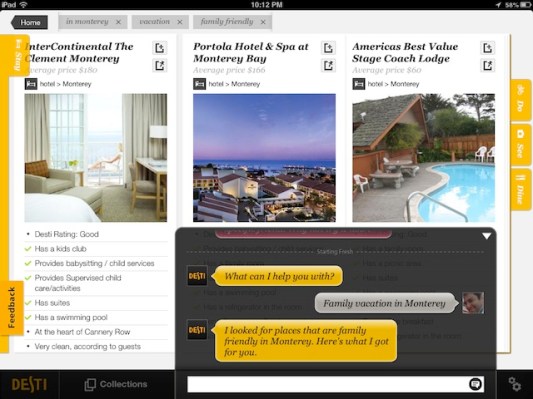There’s no shortage of travel guides and services on the web, but in some ways, that can be a curse — travel-planning can become a long process of browsing site after site and reading review after review. That’s where a startup called Desti comes in.
The company emerged last year from SRI International, the research institute where Siri was developed before it spun out into an independent company and then was eventually acquired by Apple. Like Siri (as well as other SRI projects, including banking-focused Lola) Desti is designed to function as a virtual personal assistant — in this case, an assistant focused on travel.
As demonstrated for me by founder and CEO Nadav Gur, when a traveler opens Desti, they can start a chat window where they tell the app what they’re looking for, such as “pinot wineries in Napa.” Desti pulls data and content from around the web to provide you with a list of (you guessed it) pinot wineries in Napa. Users can look at the details of each location — not just the basic facts, but also summaries that “extract meaningful fact and meaningful sentiment” from the available content. So if someone’s looking at a hotel listing, the app could tell them that a number of reviews said that it was great for families, or that most visitors complained about the cleanliness.
If users find items they like, they can save them into a collection. (Eventually, Gur said he wants to make those collections collaborative, so that multiple people can plan a trip together.) And they can continue their searches in a way that’s sensitive to context, for example following up their pinot search with the command, “Show me more good wineries nearby.” The results are personalized to your intent and context — the company claims that “No Desti user sees the same content.”
Gur also points out that Desti doesn’t take any money from the hotels for bookings or promotions, so users can trust it to be completely objective in its assessments.
The idea for the app came from Gur’s own experiences with travel. He said that before a trip to Mexico with his wife, he found a good deal on a hotel, then discovered another hotel that had similar ratings but was much cheaper. The cheap hotel seemed like an obviously better choice — until Gur actually read a bunch of the reviews. He realized visitors to the cheap hotel didn’t have a great experience, but they didn’t want to judge it too harshly since it was so cheap.
“I just came into the office the next day knowing that we could [use technology to] analyze this type of information the same way a smart person would,” he said.
More broadly, Gur portrayed Desti as another layer in the online travel ecosystem. It’s not going to compete directly with sites where you find hotels or buy plane tickets. Instead, it should sit on top of those services, perhaps becoming the first place you visit to actually plan the trip, then tapping into other services to handle the logistics.
Desti is launching in a public beta on iPad, with a focus on the San Francisco Bay Area, with more platforms and more locations to follow. The company has raised $1 million in seed funding from Horizon Ventures.
